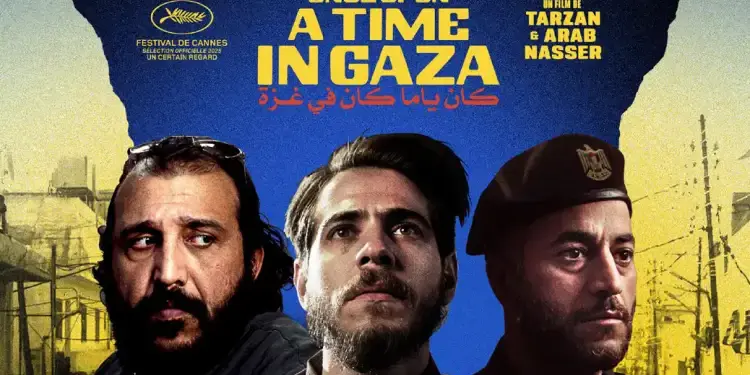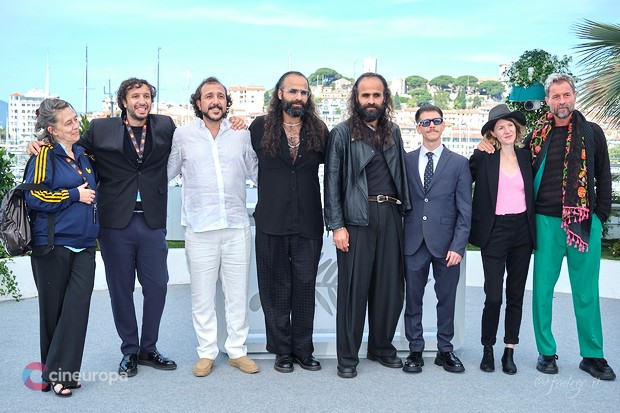Ten years after walking the Red Carpet of Cannes with their first “degraded” feature film, presented at the Critics Week, the Palestinian twin brothers Arab and Tarzan Nasser are back on the Croisette with “Once Upon a Time in Gaza”. A film of rare intensity, between black humor, raw realism and historical tragedy, carried by a breath of revolt and poetry. Presented in the Un Certain Regard section, the film was ovationed in Cannes, confirming the singular imprint of the two filmmakers in the landscape of Palestinian and world cinema.
Anchored in 2007, the intrigue of Once Upon a Time in Gaza Take place at the pivotal moment of the coming to power of Hamas, in a band of Gaza already suffocated by an increasingly severe Israeli blockade. It is in this suffocating closed camera, saturated with shortages, funeral, and regular bombing, that the two brothers weave the story of an improbable friendship between Yahya, a young erased student, and daring with a tender heart that holds a falafels shop. Together, they set up a little drug trafficking hidden in the pita breads, until a corrupt police officer turned everything away.
But Once Upon a Time in Gaza is not only the story of street traffic in a besieged territory. It is a mirror film, a stiff story that suddenly changes in the absurd when Yahya is recruited to play the main role in a propaganda film produced by the Ministry of Culture. Titled The Rebelthis “first action film in Gaza” then becomes a theater of the absurd: Yahya does not know how to play, the Palestinian extras are reluctant to embody the Israeli soldiers, and for lack of budget, the actors turn with real weapons, sometimes loaded. The grotesque then flirts with danger, in a fierce humor which never completely masks the gravity of the subject.
This abyss reinforces the political scope of the film. Because in the scenario that Yahya is supposed to embody, we discover another Yahya, head of resistance, whose history and replicas seem to respond, today, to Western speeches which systematically accuse the Palestinian resistants of terrorism. Impossible not to think of Yahya Sinwar, leader of Hamas, whose first name – coincidence? – is also that of the protagonist. This game of doubles, between fiction and reality, between the stories that are imposed and those that we erase, gives all its depth to the film.
The choice of 2007 as a starting point is not trivial. It’s the year of ” turning brutal ”, As Arab Nasser describes. The year of total isolation, collective punishment, and from the start of a long descent towards destruction. The scenes from daily life in Gaza – the absurd queues to obtain an output visa, gas cuts, separation from the West Bank – sorely resonate with news. Through the journey of Yahya, refused to leave Gaza to leave Gaza, by arbitrary refusals of the Israeli authorities, it is a whole youth locked up in an open -air prison which is portrayed with infinite tenderness.
The film, entirely shot in Jordan, was written and staged before October 7. But the real ended up catching it up, and the Nasser brothers chose, with modesty, to integrate some adjustments into the editing. Thus, the film now opens with an extract from Donald Trump’s speech, praising the tourist potential of Gaza, which he imagines in the Riviera of the Middle East. The tragic irony of these words sets the tone for a film where crazy dreams come up against the highest walls.
This political fable with creaky humor is carried by a duo of remarkable actors, who give flesh to characters in search of dignity. The film oscillates between burlesque and tragedy, between modern western and the theater of the oppressed. He shows hollow heroes, steeped in contradictions, tossed between pride, survival instinct and a quest for recognition.
But Once Upon a Time in Gaza does not just denounce. He also tells, with emotion, the relentlessness to live despite everything. This life force crosses the film, in looks, dialogues, silences. In this friendship between Yahya and Osama, in the dreams of cinema that arise at the heart of the disaster, in the humor that defuses horror, there is something universal, a human pulsation that war cannot suffocate.
After the screening, the Nasser brothers appeared moved to the Cannes audience. And in a strong gesture, one of them brandished his baby in his arms. Paternal pride, certainly, but also a powerful symbol of continuity and resistance. At a time when their family was ravaged from war in Gaza, this gesture was anything but trivial. He brought in him the assertion that despite destruction, life continues, and that future generations are there, alive, standing, ready to testify.
“One day the genocide will end “Launched one of the two brothers in front of the room. “” And the stories that we will hear will be a shame for humanity. »» Once Upon a Time in Gaza is one of these stories. A story that refuses simplification, which thwarts the imposed categories, which refuses to sort between drama and comedy, between propaganda and fiction, between victim and hero. It is a film about the right to tell, on memory, on the refusal of erasure. It is an act of cinema, but above all an act of survival.
Neïla Driss










